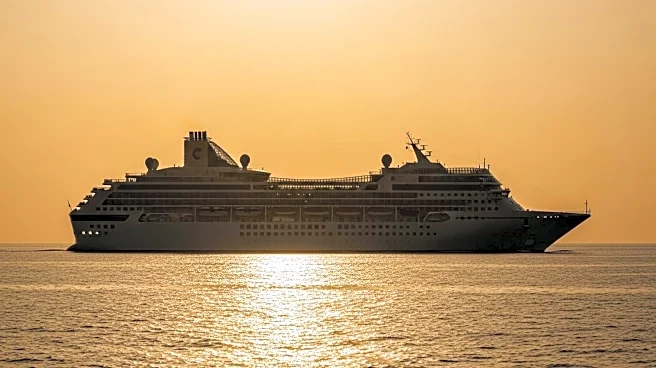What is the story about?
What's Happening?
In 2024, the cruise industry experienced a significant resurgence, with 34.6 million travelers opting for cruise vacations, marking a 16% increase compared to pre-COVID-19 levels. The average age of cruise passengers has dropped to 46, with many first-time travelers. This growth is largely driven by Generation X and Y, who appreciate the financial predictability and convenience of cruise vacations. Cruise lines are operating at near-full capacity, with surging stock prices and major investments in new ships. The industry has also undergone an image overhaul, focusing on energy-efficient vessels and creative marketing campaigns to attract diverse demographics.
Why It's Important?
The cruise industry's comeback is significant for several reasons. It highlights a shift in consumer preferences towards predictable and convenient travel options, especially among younger generations. The industry's growth contributes to economic recovery, with increased demand leading to job creation and investment in new technologies. Additionally, the industry's efforts to address environmental concerns by adopting energy-efficient practices reflect a broader trend towards sustainable tourism. The resurgence of the cruise industry also indicates a potential increase in global tourism, benefiting related sectors such as hospitality and transportation.
What's Next?
The cruise industry is expected to continue its growth trajectory, with projections indicating 37.7 million passengers in 2025. Companies are investing in new ships and technologies to meet the demand for personalized, eco-friendly, and exclusive voyages. However, the industry faces challenges such as geopolitical tensions affecting cruise routes and environmental restrictions in certain regions. Cruise operators will need to navigate these challenges while maintaining customer satisfaction and expanding their market reach.
Beyond the Headlines
The cruise industry's revival raises ethical and environmental questions. While the industry is adopting greener practices, it remains one of the most polluting sectors in tourism. The balance between economic growth and environmental responsibility will be crucial for the industry's long-term sustainability. Additionally, the industry's focus on financial predictability and convenience may influence broader travel trends, potentially impacting traditional tourism models.
















